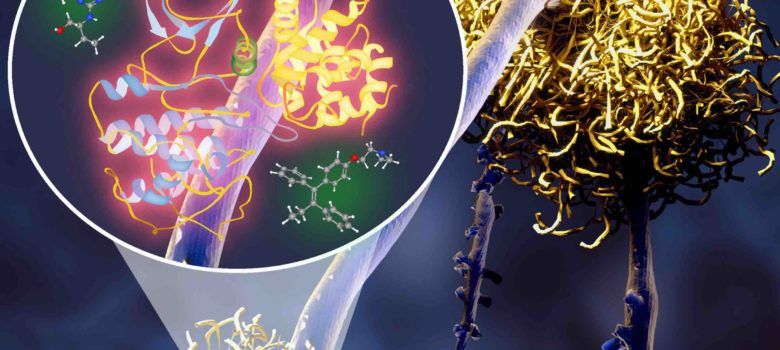

When a Good Protein Goes Bad: Cdk5’s Role in Neurodegenerative Disease
by Guest Author
Neurodegenerative disease is a broad term for a range of conditions that mostly affect neurons in the human brain. Currently, 5 million Americans suffer from Alzheimer’s disease; 1 million from Parkinson’s disease; and 30,000 from Huntington’s disease.
Risk of neurodegenerative disease increases with age; it is expected that the prevalence of these diseases is going to increase as the proportion of Americans over 65 increases.
Unfortunately, these disorders are difficult to treat, and many remain incurable.
How Do Proteins Fit In?
One of the mechanisms underlying these diseases is the dysfunctional activity and/or buildup of certain proteins in the brain, causing a chain of biological events that lead to the progressive degeneration and eventual death of nerve cells. For example, one of the hallmarks of Alzheimer’s disease is the build-up of beta-amyloid protein aggregates outside of neurons, and tangles tau protein inside of them. Many drugs have been developed to target these two types of aggregates directly, and none have been successful.
In general, the selection of a therapeutic target is one of the biggest challenges in developing effective drugs.
Cyclin Dependent Kinase 5 (Cdk5)
In our recently published review in the professional journal ACS Chemical Neuroscience, we discuss a protein Cdk5, that has significant influence on brain function, which we are exploring as a key target for treating multiple neurodegenerative diseases.
When this protein is functioning normally, it is critical for brain development in the womb, the movement and structure of neurons, and memory formation.
However, when Cdk5 becomes overactive, it causes several dysfunctional processes within neurons, leading to the build-up of toxins and cell death that promotes disease.
We discuss these processes in the context of Alzheimer’s, Parkinson’s, and Huntington’s disease, as well as past efforts to treat these diseases by targeting Cdk5. We also discuss future strategies for targeting this protein, some of which are currently being investigated by our Drug Discovery and Nanomedicine Lab at the Saint John’s Cancer Institute.
For more information, contact Dr. Venkata Yenugonda at vmy@jwci.org.
Last updated: May 5th, 2022